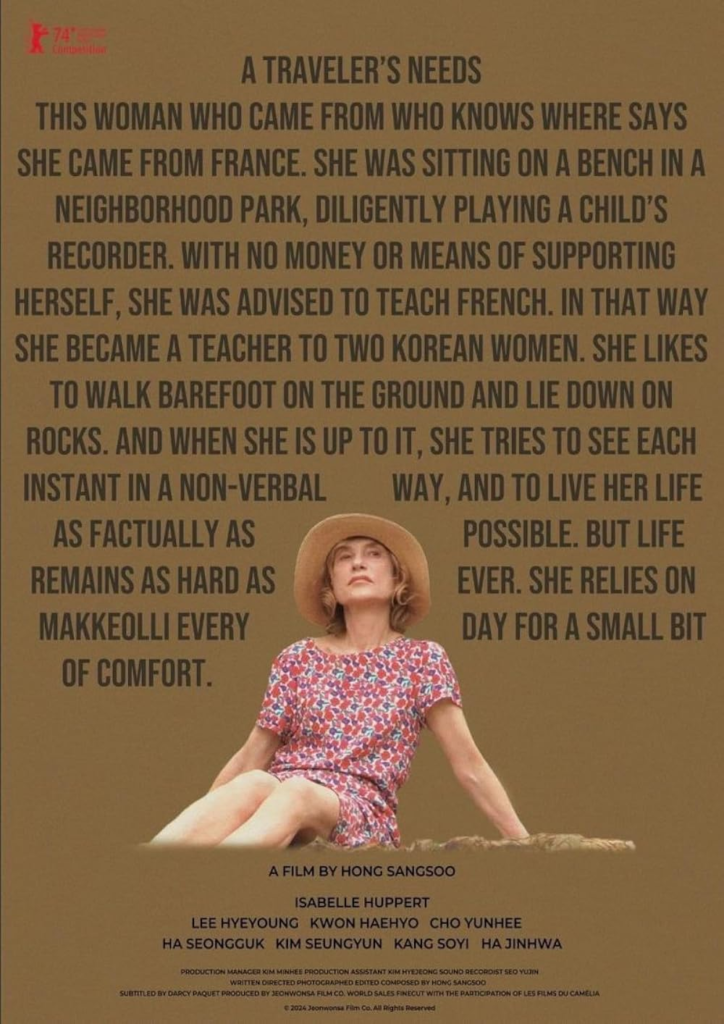A Traveler’s Needs Christian Review

Hong Sang-soo’s A Traveler’s Needs doesn’t shout. It doesn’t even speak loudly. Instead, it murmurs—a soft, enigmatic song drifting through a summer haze. If cinema often feels like a cacophony of sound and fury, this film is a lull in the storm. It whispers instead of demanding, and in that quiet space, it leaves room to think, feel, and reflect.
At its heart, A Traveler’s Needs is a slice of life wrapped in layers of subtle intrigue. It’s the kind of film you don’t just watch; you experience it in waves, like sunlight breaking through clouds or the rustle of leaves on an aimless walk. It lingers in your mind long after the credits roll, raising questions and offering little by way of answers. But therein lies its charm, and perhaps its challenge, particularly for an audience accustomed to neat resolutions.
A Woman in Green
At the center of it all is Iris, played by the inimitable Isabelle Huppert. If anyone can embody the ethereal and the grounded simultaneously, it’s her. Dressed in a loose summer dress and a bright green cardigan, she seems to float through Seoul’s streets like a ghost—or maybe a guide—hinting at unseen depths without ever revealing them outright.
Huppert’s performance is quintessentially Huppert: understated, magnetic, and tinged with a droll humor that suggests she’s in on a joke the rest of us can’t quite grasp. She’s endearingly scattered, as if she’s perpetually half a step ahead of herself, but there’s a precision to her chaos. She’s not just drifting; she’s observing, absorbing, navigating a world that feels both familiar and foreign.
Her green cardigan feels like more than a costume choice—it’s a symbol. Of what, exactly? Maybe life, maybe growth, maybe hope. Or maybe it’s just green, and the symbolism is ours to impose. That’s the beauty of Hong’s work: it invites interpretation without demanding it.
Conversations as Combat
Hong’s films are often built on dialogue, but don’t mistake that for simplicity. His conversations are battlefields, words wielded like swords to cut through pretense and expose vulnerabilities. In A Traveler’s Needs, the dialogue feels deceptively casual, but every exchange hums with unspoken tension.
As a Christian viewer, it’s impossible not to think of Proverbs 18:21: “Death and life are in the power of the tongue.” Words in this film carry weight. They wound, they heal, they reveal the hidden corners of the soul. Watching these verbal duels is like eavesdropping on someone else’s therapy session—uncomfortable at times but undeniably compelling.
The Poet and the Puzzle
One of the film’s most intriguing threads involves the translation of Yoon Dong-ju, a Korean poet who died in Japanese captivity during World War II. This isn’t a film about poetry, per se, but the struggle to translate Yoon’s work becomes a metaphor for something larger: the human desire to make sense of the incomprehensible.
Translation is a tricky thing. It’s not just about finding the right words but capturing the spirit, the essence. And isn’t that what we’re all trying to do in our own lives? To take the messy, chaotic, beautiful experiences of being human and translate them into something meaningful?
For Christians, this struggle resonates on a spiritual level. Sharing the Gospel, for instance, is an act of translation—conveying eternal truths in ways that speak to the hearts and minds of others. Yoon’s poetry, with its layers of beauty and pain, becomes a stand-in for the truths we all grapple with, the things we try—and often fail—to articulate.
Light as Mist, Heavy as Thought
Critics have called A Traveler’s Needs “profoundly slight,” and they’re not wrong. The film feels ephemeral, like mist rolling through a valley. It’s there, and then it’s not, leaving only the memory of its touch.
But slight doesn’t mean insignificant. In fact, the film’s lightness is its strength. It doesn’t hit you over the head with its themes; it lets them drift around you, seep into your consciousness. It’s a reminder that not all truths need to be shouted. Some are better whispered, allowed to sink in slowly.
This mist-like quality mirrors the fleeting nature of life itself. James 4:14 describes life as a vapor, here one moment and gone the next. Hong’s film captures that transience, the way time slips through our fingers, leaving behind only fragments—an overheard conversation, a shared glance, a poem half-understood.
The Intrigue of the Ordinary
Unlike many of Hong’s films, which often center on artists and intellectuals, A Traveler’s Needs ventures into slightly new territory. Its characters aren’t filmmakers or poets; they’re ordinary people navigating ordinary lives. And yet, their stories feel anything but mundane.
This shift feels deliberate, a way of grounding the film’s themes in the everyday. It’s not about grand artistic gestures but the quiet moments that make up a life. For Christians, this focus is a reminder that the sacred is often found in the ordinary. Every cup of coffee, every conversation, every step through a bustling city is an opportunity to encounter grace.
Faith in the Wandering
There’s a restlessness to A Traveler’s Needs, a sense of movement without a clear destination. Iris wanders through Seoul, not lost but not entirely found, either. Her journey isn’t about getting somewhere; it’s about being present, observing, engaging with the world around her.
This resonates deeply for Christians, particularly those familiar with the idea of pilgrimage. Life itself is a journey, a wandering through the wilderness in search of something greater. But sometimes the wandering is the point. Sometimes the act of moving, of seeking, is where we find God.
A Film for the Patient
A Traveler’s Needs isn’t for everyone. Its slow pace, cryptic narrative, and lack of traditional structure demand patience and openness. But for those willing to sit with it, to let it wash over them like a soft rain, it offers rewards that are both subtle and profound.
It’s a film that doesn’t just entertain but invites reflection. It asks us to consider how we communicate, how we connect, how we make meaning in a world that often feels inscrutable. And it does so with a lightness that belies its depth.
A Final Reflection
As the credits roll, you might find yourself unsure of what exactly you’ve just experienced. And that’s okay. A Traveler’s Needs isn’t a puzzle to be solved but a moment to be savored, a glimpse of life in all its messy, fleeting beauty.
From a Christian perspective, it’s a reminder of the power of words, the mystery of grace, and the sacredness of the ordinary. It’s a call to be present, to listen, to wander with intention.
Rating: 8.5/10
A film as light as mist yet rich with meaning, A Traveler’s Needs is a quiet triumph—a cinematic breath of fresh air that lingers long after it’s gone.




